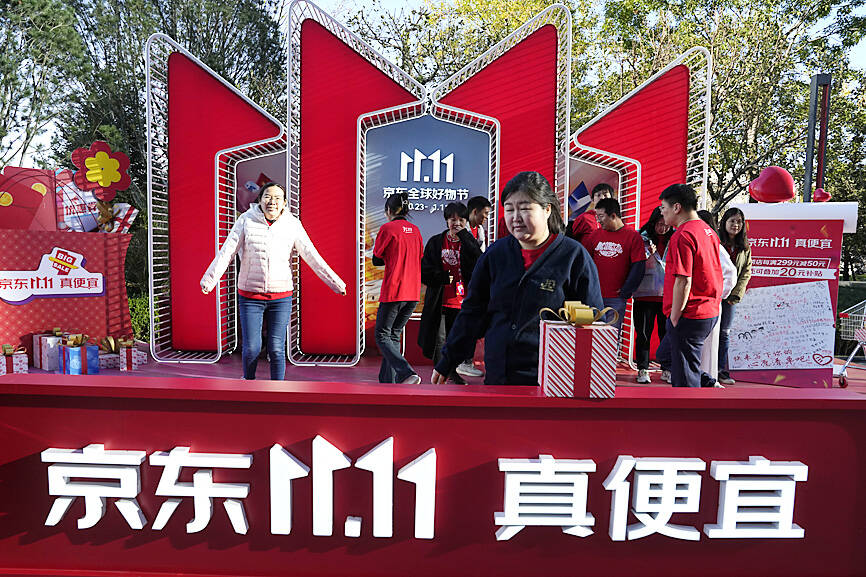Shoppers in China have been tightening their purse strings, raising questions over how faltering consumer confidence could affect Saturday’s annual Singles’ Day online retail extravaganza.
Singles’ Day, also known as “Double 11,” was popularized by e-commerce giant Alibaba Group Holding Ltd (阿里巴巴). In the days leading up to the event, sellers on Alibaba and elsewhere often slash prices and offer enticing deals.
Given prevailing jitters about jobs and a weak property market, it is unclear how this year’s festival will fare.

Photo: AP
A Bain & Co survey of 3,000 Chinese shoppers found that more than three-quarters of respondents plan to spend less this year, or keep their spending level, given economic uncertainties.
Chinese consumers were much more eager to splurge before COVID-19 hit in 2020. Shoppers spent US$38 billion within 24 hours on Alibaba’s e-commerce platforms during Singles’ Day in 2019.
However, Chinese have become much more cautious over splurging out on extras, analysts say.
“The hype and excitement around Singles’ Day is sort of over,” China Market Research Group managing director Shaun Rein said. “Consumers have over the last nine months been getting discounts on a steady day-to-day basis, so they aren’t expecting major discounts on Singles’ Day except for consumables,” he said.
Rein said shoppers would likely be keener to pick up deals on daily necessities such as toothpaste, tissue paper and laundry detergent, rather than high-end cosmetics and luxury brands.
E-commerce platforms are emphasizing low prices for this year’s shopping spree event, hoping to attract value-conscious customers looking for good deals.
For this year’s campaign, Alibaba’s Tmall (天貓) boasted “Lowest prices on the Web,” while e-commerce platform JD.com Inc’s (京東) tagline for its Singles’ Day campaign is “Truly cheap.” Rival PDD Holdings Inc’s (拼多多) is “Low prices, every day.”
Some of their business strategies helped boost sales, it said.
JD.com yesterday said that its transaction volume, order and user numbers during the festival all hit another high, without providing specific figures.
It said that more than 60 brands have recorded more than 1 billion yuan (US$137 million) in sales, and that nearly 20,000 brands saw their transaction volume surge more than three times from the same period last year.
Earlier, the retailer said its new merchants saw their order numbers jump more than five times compared with the same period last month.
JD.com Consumption and Industry Development Research Institute senior researcher Lu Fei (陸飛) said the company’s sales figures showed there was still an “obvious” growth in consumption.
“The growth in the sales of mobile phones, jewelry and domestic appliances shows that there’s a user demand for quality growth, but undeniably, consumers are becoming more and more rational,” Lu said.
About 400 brands saw their gross merchandise value surpass 100 million yuan and 38,000 brands saw their GMV double year-on-year as of midnight on Saturday, an article on Alibaba’s Alizila news hub said.
The company’s Taobao (淘寶) and Tmall Group recorded growth in order numbers, among other areas, during the sale spree over the same period last year, it added.
Business volumes for express delivery service providers hit a new record during the sale period, China’s State Post Bureau said on Sunday.
Express delivery companies collected nearly 640 million express packages nationwide on Saturday, up 15.8 percent year-on-year, it said.

Intel Corp chief executive officer Lip-Bu Tan (陳立武) is expected to meet with Taiwanese suppliers next month in conjunction with the opening of the Computex Taipei trade show, supply chain sources said on Monday. The visit, the first for Tan to Taiwan since assuming his new post last month, would be aimed at enhancing Intel’s ties with suppliers in Taiwan as he attempts to help turn around the struggling US chipmaker, the sources said. Tan is to hold a banquet to celebrate Intel’s 40-year presence in Taiwan before Computex opens on May 20 and invite dozens of Taiwanese suppliers to exchange views

Application-specific integrated circuit designer Faraday Technology Corp (智原) yesterday said that although revenue this quarter would decline 30 percent from last quarter, it retained its full-year forecast of revenue growth of 100 percent. The company attributed the quarterly drop to a slowdown in customers’ production of chips using Faraday’s advanced packaging technology. The company is still confident about its revenue growth this year, given its strong “design-win” — or the projects it won to help customers design their chips, Faraday president Steve Wang (王國雍) told an online earnings conference. “The design-win this year is better than we expected. We believe we will win

Chizuko Kimura has become the first female sushi chef in the world to win a Michelin star, fulfilling a promise she made to her dying husband to continue his legacy. The 54-year-old Japanese chef regained the Michelin star her late husband, Shunei Kimura, won three years ago for their Sushi Shunei restaurant in Paris. For Shunei Kimura, the star was a dream come true. However, the joy was short-lived. He died from cancer just three months later in June 2022. He was 65. The following year, the restaurant in the heart of Montmartre lost its star rating. Chizuko Kimura insisted that the new star is still down

While China’s leaders use their economic and political might to fight US President Donald Trump’s trade war “to the end,” its army of social media soldiers are embarking on a more humorous campaign online. Trump’s tariff blitz has seen Washington and Beijing impose eye-watering duties on imports from the other, fanning a standoff between the economic superpowers that has sparked global recession fears and sent markets into a tailspin. Trump says his policy is a response to years of being “ripped off” by other countries and aims to bring manufacturing to the US, forcing companies to employ US workers. However, China’s online warriors